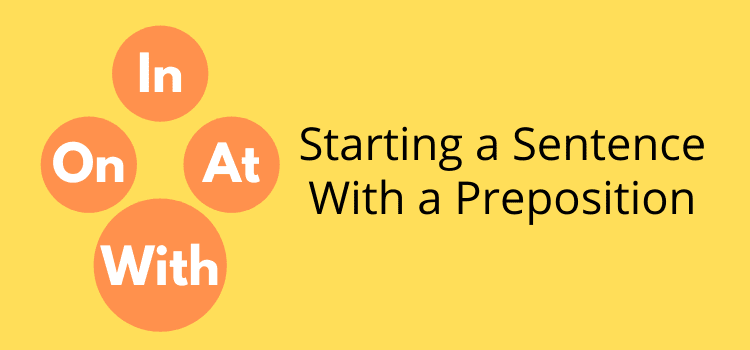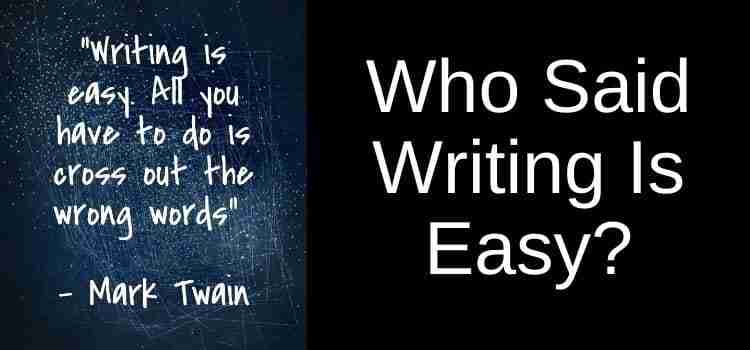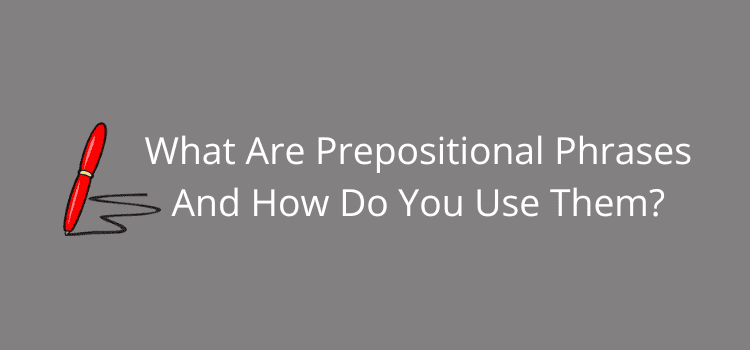
In fact, there’s no reason why you can’t start a sentence with a preposition.
As with all aspects of writing, though, you should use it in moderation.
However, it is an easy way of adding variety. By using it occasionally, it helps you vary the syntax of your sentences.
With that in mind, let’s look at how you can use them correctly.
Start a sentence with a preposition, but beware of the comma
Can you start a sentence with a preposition?
Yes, there’s no problem at all.
The only caution you need to take is when to use a comma.
How often do you read that warning?
But in this case, you need to get it right.
If you use a prepositional phrase to start a sentence, you usually need a comma.
But if the preposition is integral to the sentence, there is often no comma.
Are you confused?
Well, there’s no need to be because it’s pretty easy to tell the difference.
On that note, here are some examples to help you.
When to use a comma
If you start a sentence with a prepositional phrase, it is often followed by a subject-verb phrase.
In this case, you can use a comma.
On the other hand, you don’t use a comma when there is no subject.
After work, Mary goes swimming.
Over the holiday period, we spend time with our family.
By this time tomorrow, Luke should have passed his driving test.
With a bit of practice, you will know when to add a comma.
In the examples above, I have used a comma.
But it is not always essential.
Grammarly states that both with and without the comma are correct.
But on the other hand, Purdue says that you should not use a comma if the introductory phrase is fewer than five words.
It’s a matter of style and choice for each writer.
I prefer to add a comma, but that’s not to say that you should, too, in all cases.
Use your judgment as to what works best for you.
When there is no comma
If there is no subject following the opening prepositional clause, you generally don’t need to use a comma.
On top of the dessert was a big cherry.
In the middle of the golf course is a vast lake.
In love and over the moon is for the young at heart.
With practice comes perfection.
However, it’s not a golden rule. If you use a comma, it’s not incorrect.
With this punctuation point, the comma is a matter of stylistic choice.
But I tend to think that Perdue offers the best advice.
If it’s a phrase of fewer than four words, you don’t need to use a comma.
It’s up to you to decide.
But whatever style you choose, make sure you are consistent with your comma use.
What about a preposition at the end of a sentence?
Yes, it’s always fine to start a sentence with a preposition, but what about at the end?
This is when things get a bit more complicated.
In today’s English, I think it’s okay to end a sentence with a preposition.
But in saying that, if you can easily avoid it, it’s probably better.
Winston Churchill tackled this grammar point with this quote.
It is a rule up with which I shall not put.
With it, he was pointing out how silly it is to always obey the rule of not ending a sentence with a preposition.
There are times when it is impractical and also doesn’t fit with modern English.
Who did you go to the cinema with?
With whom did you go to the cinema?
It would seem extremely formal to rewrite this sentence using whom.
How to avoid a dangling preposition
A preposition at the end of a sentence is sometimes called a dangling or hanging preposition.
It’s a matter of writing style and the level of formality that you need to consider if you want to rewrite a sentence.
Sometimes it’s easy to move a preposition. But in other cases, it can be difficult or awkward.
What was the lecture about?
I don’t know where he comes from.
Oh, I think I left the oven on!
In these three examples above, it is not practical to move the preposition.
But in the following examples, it’s very easy to move the preposition.
A good job is hard to come by.
It’s hard to come by a good job.
In our modern lives, we have so much to be grateful for.
We have so much to be grateful for in our modern lives.
Political science is what I want to focus on.
I want to focus on political science.
A preposition at the end of a sentence or question is not wrong at all.
But if you can easily avoid it, then it’s often better to rewrite the sentence.
Summary
It’s always fine to start a sentence with a preposition and also to end a sentence.
Both of them are stylistic choices for writers.
When you use a prepositional phrase at the beginning of a sentence, the only decision to make is when to add a comma.
If the phrase is more than three or four words, I would usually add a comma. But for two words, perhaps not.
As for ending a sentence, it’s a choice. For all forms of informal writing, there is no problem at all.
But for formal or academic writing, it’s usually better to avoid or move the preposition.
There are no hard and fast grammar rules to follow for these prepositions, except to be consistent with your use.
Related reading: When To Capitalize Long Prepositions In Book Titles




Ah! Prepositions. I often feel these little words are over-used. Especially in things like ‘He returned back home,’ or ‘she put the book down on the table.’ So often used when not needed.
But I’ve always struggled with whether one can be used at the end of a sentence. Thanks for your clarification at both ends.